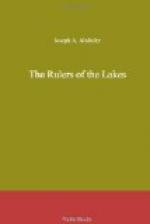“But the creeping four will be fired upon.”
“I think so, too, Dagaeoga, because there is no longer any reason for us to delay, and the rifle of the Great Bear will speak the first word.”
There was a report near them, and one of the warriors, sinking flat in the grass, lay quite still. Robert, through the bushes, saw Willet, smoking rifle in hand. The three savages who lived began a swift retreat, and the others behind them uttered a great cry of grief and rage. They fired a dozen shots or so, but the bullets merely clipped leaves and twigs in the thickets. Nobody among the defenders save Willet pulled trigger, but his single shot was a sufficient warning to Tandakora and De Courcelles. They knew that the creek was held strongly.
Now ensued another long combat in which the skill, courage and ingenuity of warriors and hunters were put to the supreme test. Many shots were fired, but faces and bodies were shown only for an instant. Nevertheless a bullet now and then went home. One of Willet’s men was killed and three more sustained slight wounds. Several of the warriors were slain, and others were wounded, but Robert had no means of telling the exact number of their casualties, as it was an almost invisible combat, which Willet and Tayoga, as the leaders, used all their skill to prolong to the utmost with the smallest loss possible. What they wanted was time, time for the fugitive train, now far away among the hills.
So deftly did they manage the defense of the creek that the entire afternoon passed and Tandakora and De Courcelles were still held in front of it, not daring to make a rush, and Willet, Robert and Tayoga glowed with the triumph they were achieving at a cost relatively so small. Night arrived, fortunately for them thick and black, and Willet gathered up his little force. They would have taken away with them the body of the slain man, but that was impossible, and, covering it up with brush and stones, they left it. Then still uplifted and exulting, they slipped away on the trail of the wagons, knowing that the Indian horde might watch for hours at the creek before they discovered the departure of the defenders.
“You see, Dagaeoga,” said Tayoga to Robert, “that there is more in war than fighting. Craft and cunning, wile and stratagem are often as profitable as the shock of conflict.”
“So I know, Tayoga. I learned it well in the battle by Duquesne. What right had a force of French and Indians which must have been relatively small to destroy a fine army like ours!”
“No right at all,” said Willet, “but it happened, nevertheless. We’ll learn from it, though it’s a tremendous price to pay for a lesson.”
“Do we make a third stand somewhere, Dave?” asked Robert, “and delay them yet another time?”
“I scarcely see a chance for it,” replied the hunter. “We must have favorable ground or they’d outflank us. How old does the trail of the wagons look, Tayoga?”




